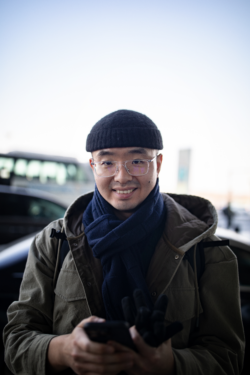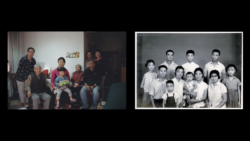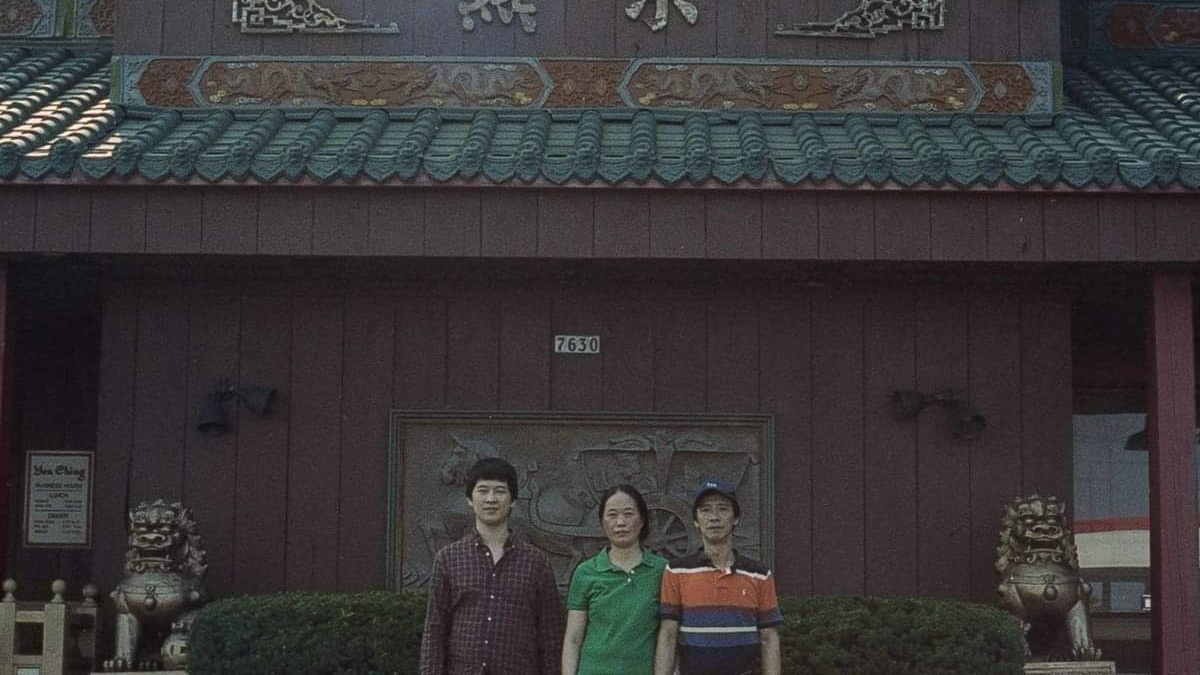When the American Dream is a Calvino dreamed by the whole world, respectively.
In Mandarin, “Yi” means “one,” and “Nan” means “man.”
“Many people think that my name has something to do with the one-child policy, but my mom said the name was given by a fortune teller,” said documentary filmmaker Yinan Wang. “It is called ‘Nan,’ written [with the character for] farm above and [the character for] power below, so that I have food and strength.”
From Beijing to Wisconsin, from Tibet to Philadelphia, Wang asked his subjects three simple but fundamental questions in his 2019 short film, “Unproblematic Problem”: Where are you from? Who are you? Where are you going?

Outside The Town of Milwaukee
“Now, I prefer to tell others that I am from Beijing,” Wang said. He lived in Beijing for the first 25 years of his life, and moved to the United States. “This year marks my 10th year in the U.S.”
During his second year in the U.S., Wang went to Maine with a friend and wanted to rent a kayak. It was a tourist city, and there were people from all over the place. The shopkeeper asked Wang and his friends: “Where are you from?”
“What should I say?” Wang recalls thinking. The simple question prompted many thoughts in his mind. By now, he had moved his family to Wisconsin, and did not plan to return to Beijing for a few years. “I thought: If someone else asks me the same question again, how should I answer it? It was a very small thing, but it bothered me for a long time. I wonder if anyone else has the same problem, so I took my camera and went out to ask.”
Wang said that he kept thinking afterward: What is an American?
In his latest documentary feature, “Decoupling,” Wang films his daughter — the first “American” in his family — experiencing being separated from her parents during the pandemic. In the film, Wang uses collages of family photos to tell the story. He said that, as a documentary filmmaker, he believes in the importance of images but at the same time questions their authenticity.

“Family portraits are a conventional image in this society. For example, if a family is together and everyone smiles, it conveys a positive and warm image,” Wang said. “I don’t know when this ‘convention’ started.” He pointed out that black-and-white photos from when photography first became available to the public typically depict somber, unsmiling faces. As cameras become more popular and accessible for everyday use, however, people’s needs and aesthetics changed. “It has become that everyone loves to laugh. What can be truly recorded? […] Bazin said that a photo is like a death mask; it cannot represent the person who died.”
Without Fear of Closure or Departure
Wang has been working in Chinese restaurants since he came to the United States. The title of his first feature documentary, “Yen Ching,” was taken from the Chinese restaurant where he worked as a delivery driver from 2014 to 2018. Chen, the boss of Yen Ching, has two children: the eldest, who helped with the restaurant, and the second son, who was in college. As the younger son approached graduation, the family debated whether he should return to help run the restaurant. Chen wanted different futures for them, respectively. This created tension. The younger son’s return or not decides the fate of the family business.
This is a common story in the United States: Chinese immigrants who arrived in the 70s and 80s opened Chinese restaurants all over the country. Now that they are on the cusp of retirement, however, nine out of ten of their children don’t want to inherit the family business, so there has been a wave of closures of American-style Chinese restaurants. “Although Yen Ching is the story of Chen’s family, many other Chinese restaurant workers should be able to see themselves in it,” Wang said.
“Yen Ching” was completed in 2018. One day in 2021, Wang’s cell phone rang while he was driving. It was a text from Chen that asked: “Are you still in the United States? Are you still in Milwaukee? We sold the restaurant.”

“They sold the restaurant because they couldn’t make it due to the pandemic,” Wang said. “In the film, his dream was to reunite the family and keep the family together, but it failed.”
In 2023, Wang and Chen met again. At that time, Chen was about to sell their house and asked Wang to help him move. The night before this interview, Chen happened to text Wang, saying that he is moving from Wisconsin to Atlanta.
“Most Chinese immigrants come to the U.S. to pursue a better life. The so-called better life can be cultural, spiritual, or material,” Wang said. “There is also a particularly illusory ‘American Dream.’ I think the world’s impression of the United States is inseparable from its own external propaganda.” He recalled that another Chinese restaurant owner once told him, “If someone can give me one million dollars, I will sell my green card. I don’t want it anymore.”
In A River Of Lines That Enlace
The same year “Yen Ching” was filmed, Wang moved to Philadelphia to begin his graduate studies. To his surprise, he found a Tibetan Buddhist temple in his new city.
“I never thought there would be a Tibetan Buddhist temple in Philadelphia,” Wang said. He had lived in Tibet for several months, and covered many documentaries while in China. He was very interested in Tibetan Buddhism, but had not expected to find it here.
This curiosity and interest were the beginning of the short film “The River.” In the film, the protagonist Losang Samten’s family fled from Tibet to Nepal and then to India during the 1959 Tibetan uprising. “There are two main religious leaders in Tibet, the Dalai Lama and the Panchen Lama. The Dalai Lama has great influence, followed by the Panchen Lama,” Wang explained. “However, if you go to every Tibetan’s home, you will see people put the Panchen Lama’s portrait in the most conspicuous place but have the Dalai Lama’s portrait in the bedroom or in a very private spot because in Tibet, you can no longer have the Dalai Lama’s portrait. Tibetans still have feelings for the Dalai Lama. We couldn’t have this conversation while still in Tibet because we might get into trouble.”

But when Wang met Losang in Philadelphia, they no longer had such scruples. Wang said that Losang had been only four or five years old when his family fled with the Dalai Lama. “Although Losang was very young at that time, the experience was imprinted. I’m sure that journey is not something that ordinary people can endure.” For Wang, Losang’s experience represents the voices of the Tibetans that Wang will never have the opportunity to meet. “There is a very subtle connection between us, because he is also very interested in me. He heard that I have been to Tibet many times, and those places are very close to his home. He kept asking me, ‘What are the places like now?’ He can only find out from an outsider.”
Around An Empty Cradle
“I think every immigrant will experience the ‘V shape’: when you first come here, you think everything is great, but the longer you live here, the more things you’ll realize. When I made ‘Decoupling,’ I was experiencing the lowest point [of the V], the darkest time of my life in the U.S.”
In “Decoupling,” Wang mentioned that the Chinese of his mother’s generation were indoctrinated with the idea of American imperialism. “‘There are all monsters over there in the U.S.,’” he recalled them saying. “‘The capitalists will eat you alive if you go there.’ The ‘task’ of their generation is to save the Americans because the Americans are living in dire straits. People of my mom’s generation have no American dream.”
Wang was born in 1987, the same year that Kentucky Fried Chicken (KFC) opened its first Chinese branch in Beijing. During this time period, his mother’s monthly salary, he recalled, was 30 renminbi (6 dollars), while a regular meal at KFC cost 10 renminbi (2 dollars). “Back then, KFC was a luxurious Western cuisine in China.” Growing up in this period of economic reform, Wang said, is the reason why students of his generation came to the United States, “They came to the U.S., thinking that the United States is good. Why? This is the result of being nurtured by American culture since we were children.”
Even now, many universities in the United States financially rely on international students because they pay a higher tuition than locals. “This is a win-win situation for Chinese students and American schools,” Wang said. “Now universities are completely commodified. Since the pandemic and during the years of decoupling between China and the U.S., the number of Chinese students in the United States has dropped sharply. The most direct consequence is the financial deficit of the school.”

For Wang, the making of “Decoupling” was very difficult. In his previous works, Wang spent most of the time as an observer, standing behind the camera. “It was the first time I made a film so personal. I didn’t have any confidence in myself. I didn’t know what to do and encountered many problems,” he recalled. “I was always hesitant because I didn’t know if people would understand my creative decisions. From pre-production to post-production, it was all done here, in the United States, and I felt the people who were involved in the project didn’t know what I was talking about, so the whole process was very lonely for me.”
Wang looked to other works for inspiration. He said he resonated the most with Ross McElwee, whose films are personal stories interspersed with historical background. His first film, “Backyard,” was shot in their backyard, where the women cooked and the men cut the grass in an expression of the gender roles in the American South. Through this imagery, he told the story of a father-son relationship and a difference in values between generations.
To Wang, making film is to communicate, not crafting a secretly sealed safe box. In 2024, Film for Mother Showcase at Beijing proved Wang’s creative decisions unvain and expressed the rock bottom he hit as an immigrant. He was relieved. “They see every detail I want to show.” Naturally, the audience in China not only connected Nixon’s speech with the family picture taken in 1972, but grasped the unspoken feelings between words. “I think this is a part that non-Chinese speaking audiences may not understand. If you only read the subtitles and don’t know the language, you won’t be able to understand the subtexts. Subtitles are rational, but language is very sentimental.”
What Story Down There Awaits Its Beginning?
Wang is currently working on a film about Bing Cherry. The only written record of Bing is found in the memoirs of a woman named Florence, which primarily discuss her father and grandfather. She briefly mentions ‘Ah Bing,’ describing him as a tall Chinese man, detailing his family and favorite songs. Although brief, her account is very detailed.
When asked where he is going and where the next stop will be, Wang said, “I don’t know.”
In the past, international students who came to the United States from China were all academically gifted. They were the elite from top universities, selected for the opportunity to study abroad because few could afford it on their own, given China’s economic conditions at the time. Today, the landscape has changed. Among the current generation, there are many like Wang. “I haven’t done statistics, but at least half of the people around me came here because they couldn’t study well and couldn’t go to university in China,” said Wang. This shift reflects broader changes in global opportunities and perspectives on education.
“I think before I came to the United States, my goal was simply to ‘come to the United States.’ After I arrived in the States, I didn’t really know where I was going. I was a planner, but I realized that in life, few things go as planned. Filmmaking taught me improvisation. My intuition now is to just go with the flow. The only thing clear is that my direction is not clear.”
Yinan Wang’s “Decoupling 脱钩” is screening at the 47th Asian American International Film Festival.


Excited to see this film!